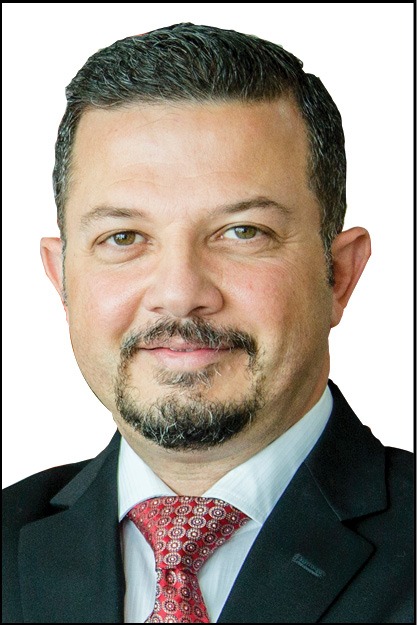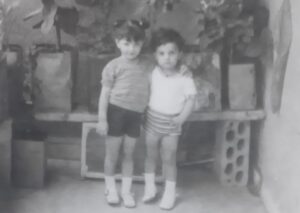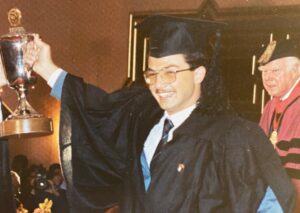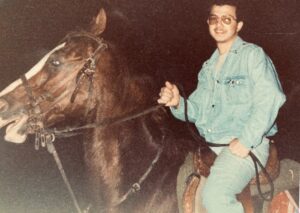Ghassan Freiwat, Deputy CEO, Awal Gulf Manufacturing, speaks of grit, as having helped him prise open a world of opportunities in the face of challenges. In this up-close-and-personal interaction, he speaks of the importance of collective grit, of cross-industry collaboration in averting the threat of diluting the basic concept of Perceived Market Value, amongst other measures that need to be taken to protect the marketplace
 The early years
The early years
I strongly believe one’s roots are where one lives. I am also who I am owing to the many people I have met.
I am deeply rooted to my place of origin. I am from Acre, in northern Palestine, which is where my heart is. I was, however, born in Dbayeh, a city that lies in between Beirut and the famous port of Jounieh, in Lebanon, in the year 1968.
My father, Nour Freiwat was an architect by qualification, who handled a broad construction-related portfolio of activities as a site superintendent, which included civil engineering functions. He loved the breadth and depth of design. He also enjoyed taking up the challenge of executing chattering design for large complicated projects. On many instances, his own designs used to gain approval as amendments to the consultant’s drawings.
I attended the Evangelical School in Dbayeh, where I studied up to Grade 2. The early school years were fun, but all of that changed, when civil war broke out in Lebanon, in April 1975.
In the beginning, no one expected the war to be a protracted one – that it would last for 15 years – for the country had passed through several incidents of political turmoil, but unfortunately, 1975 was different.
In March 1976, the situation deteriorated to the extent that my parents, siblings and I had to flee in order to save our lives. It wasn’t easy to leave the country, as all our relatives and extended families from both sides of my parents were living in Lebanon, especially from my mother’s side, who is Lebanese.
We arrived in the UAE, where my father took up an assignment with a leading contracting company in Abu Dhabi. Over the next several years, though, my father took up new assignment after new assignment, which gave us the opportunity to experience life in different parts of the UAE. We finally settled in Dubai in 2007.
In between moving homes, I also left to pursue my bachelor’s degree in Egypt, where I stayed for five long years.
The world of bells and whistles
As a boy growing up in the UAE, I envisioned myself as an airline pilot. In later years, I aspired to become an ophthalmologist. At the same time, I was aware and appreciative of my father’s prodigious architectural talent. In the course of assignments with such construction companies as Mother Cat, CCC and Arabian Construction, he worked on such landmark projects as Dubai Mall and the Emirates Palace in Abu Dhabi. Earlier, in 1977, he had the opportunity of working on Al Shaab Sports Club project, the first ever mega sports centre in Sharjah at the time.
My father’s inspiring work influenced and motivated me to become an engineer. It was an easy choice, even otherwise. I was a brilliant student throughout my academic years. My favourite subject whilst in school was Physics, in which I consistently scored full marks. I was naturally curious about science, which prompted me to explore it to my heart’s content.
So, when it came to joining university, engineering was a natural progression. I attended the American University in Cairo and, in 1990, earned a bachelor’s degree in Mechanical Engineering, with a minor in Business Administration. As an ancillary subject, I studied Industrial Engineering.
Subsequently, I earned a master’s degree in International Management, with merit, from Liverpool University, in the United Kingdom.
Later, motivated by a desire to constantly keep learning, I studied to earn a Post Graduate Diploma in Air conditioning and Refrigeration from ICS – Scranton, in the United States and an Associate Degree in Business Management from the same institute. I also have a 6 SIGMA under my belt.
The pull of the HVACR industry

Childhood days in Lebanon: Ghassan Freiwat with his sister, Carmen
As I said earlier, HVACR industry was surely not in my plan for a career; it was destiny that shaped my career choice.
Backed by the degree in Mechanical Engineering and my knowledge of Industrial Engineering, I secured a job with a large multinational company in Saudi Arabia in 1990. But, excitement soon gave way to disappointment, when I failed to secure a visa to continue with the job. I returned to Dubai and started knocking on every possible door to find a suitable opportunity. And while waiting, I took up a few odd sales jobs, which taught me valuable lessons on the process of selling. I also had a short stint in the fire and safety industry and in the automotive industry. However, even those assignments were short-lived – in August of 1990, the Gulf War started, and all new joiners were the first to be let go.
Life was tough; however, I never let the disappointment deter me. Three months later, I applied for a job with Juma Al Majid Establishment, in my view one of the leading electro-mechanical companies in the UAE, specialising in the HVAC industry and, as a regional agent, representing some of the leading HVAC brands in the world. To my delight, the company took me in as a trainee. From there, I worked my way up the ladder to eventually become the Department Manager; I continued in this role till April 2000.
The Juma Al Majid years were memorable. During my tenure as Department Manager, I led the commercial business within varied streams of unitary projects contracting, direct unitary equipment sales and air conditioning accessories. As manager, I led teams, set their goals, implemented strategic plans, and managed orders, sales and margin.
After Juma Al Majid, I joined Trane Air-conditioning as Business Development Leader. Trane was part of American Standards in those days; later, in 2009, it was acquired by Ingersoll Rand. In 2020, Trane and Ingersoll Rand became two independent companies, and Trane was rebranded as Trane Technologies.
The Trane years were equally memorable – I witnessed the company grow exponentially in the Middle East & Africa region. From Business Development Leader, I moved up the ladder to be the Commercial Director for the entire product portfolio, which gave me an opportunity to oversee business in nearly 70 emerging markets in the region. I gained experience working for the full portfolio product cycle, along with sales and forecasting, pricing strategy, order management, logistics, integrated supply chain and marketing.
Dropping anchor in Bahrain

During the graduation ceremony, American University in Cairo, 1990
In March 2020, I moved to the Land of Two Seas, where I joined Awal Gulf Manufacturing as Deputy Chief Executive Officer.
Awal Gulf Manufacturing is a leading HVACR manufacturing company that serves customers in over 40 countries through an extensive dealer network across the EMEA region and also through long-standing OEM partners. The company’s history goes back to 1970, when its air conditioning division was represented by the US brand, Friedrich under the broad umbrella of AWALCO Group. In 1993, Awal Gulf Manufacturing came into being with a broad vision of achieving the status of largest manufacturer of HVACR products in the MEA region. The company’s in-house brand, PEARL has resonated well with customers in Bahrain for over four decades, as have some of the other brands, Universal Air and Marshal.
I see Awal Gulf Manufacturing as a field of endless opportunities for growth and expansion, contributing to the overall HVACR industry. I view it as a great place to implement a turnaround strategy that can lead to totally new market dynamics. My goal and vision for the company is to make it a leading player in the HVACR industry in the MENA region and not just in Bahrain or in the GCC region.
What IAQ means to me – COVID-19 and otherwise
In simple terms, indoor air quality (IAQ) is critical to the health and safety of people. The world is currently passing through an unprecedented time, and indoor air quality has never been so critical to the human race from those two perspectives. Of course, clean air becomes especially critical in hospitals, clinics and other healthcare facilities to protect patients, staff and visitors from airborne diseases and infections.
We often talk about how to find solutions to reduce greenhouse gas emissions, as part of our commitment towards sustainability. There is absolutely no doubt that this is extremely important, as the whole world has realised the impact of global warming and also of ozone-depleting substances.
I can say that today, and in the context of COVID-19, we should give equal importance to the internal environment as we have been giving to the external one. COVID-19 has been an eye opener to all of us to start thinking seriously of how to improve our internal environments.
Broadly speaking, we need good IAQ, because majority of the people spend 90% of their time indoors, especially in countries like those in the GCC region, where you would need to keep the air conditioning on for most of the year. And let us not forget that even our lifestyle has changed, driven by a new trend of online education and working.
Scientifically speaking, in the case of the pandemic, we have to go the extra mile to be able to deal with SARS-CoV-19, which, in size, falls within the range of 0.08 – 0.15 microns. In order to visualise the magnitude of the size, simply remember that the naked eye can see only those particles that are bigger than 70 microns in size, which you may think of as being the average diameter of a human hair. Moreover, particles that are larger than one micron tend to settle on surfaces rather than continue to float in the air.
Whilst developing a solution to improve IAQ, this simple piece of scientific information must be kept in mind. Awal Gulf Manufacturing, for instance, has taken the step of harnessing its engineering capability and R&D efforts to launch the Pearl air purification unit, which is inclusive of a portable HEPA filter system with UV-C technology for removing airborne containments and for undertaking germicidal air disinfection with a filtration efficiency of 99.999%, down to 0.3 micron particles, H14, as per EN1822.
The company’s main focus has been around new products that help recirculated air gets filtered to 99.999%, removing all particulate matters and microorganisms with the objective of creating an environment free of contaminants to reduce the risk of any possible infection. The unit can be placed in common areas, hospitals and ancillary healthcare facilities, including research laboratories and pharmaceutical plants. The unit’s application is not only limited to the healthcare vertical but can also be used in residential applications, educational institutions and other commercial applications.
Striking a balance between IAQ and energy efficiency
I certainly believe IAQ has been the talk of the town, particularly during these unprecedented times. The need for clean and safe air has never been given this much importance before. Having said that, the momentum still needs to be there. I tend to believe that energy efficiency will still be getting a higher priority compared to IAQ until we start seeing the global community as being led by international regulatory and legislative bodies. Let us think of sustainability and greenhouse gas emissions for a second. The industry began to take climate change seriously only after the Montreal Protocol established a clear timetable of phasedown of gases responsible for accelerated global warming and depletion of the ozone layer. I strongly believe a similar effort needs to be considered in the case of IAQ, if we wish to change the mindset of our society.
Maintaining a properly controlled IAQ is indispensable in the war against COVID-19. The built-environment requires more fresh air changes. To counter-balance the potential increase in the electrical load and the hike in the utility bill, it is important to consider using well-designed air purification units that can handle 12 air changes per hour, say. It doesn’t mean, though, that the units will totally eliminate the impact on power consumption, but they can partially help. Let us not forget that health and safety are more important than money, so it is important that we place our faith in such equipment. Such units need to be equipped with a proper HEPA filter H14, as per EN 1822, which can remove a broad range of airborne containments with a filtration efficiency of 99.999%, as well as a high-quality UV light for germicidal air disinfection, in addition to other standard features, like carbon filters and stainless steel structure.
Awal Gulf Manufacturing takes energy consumption very seriously, indeed, and hence its reliance on traditional solutions, like energy-recovery wheels, inverter technology and efficient moving components. The need for the right solutions to achieve ideal IAQ is a vital one. Awal Gulf Manufacturing is, hence, focusing on innovative products that are not only efficient but are also able to operate while consuming less power and even utilise clean sources of energy; taking such a direction will be a key attribute of the company’s growth strategy. The company is currently working on a technology that I expect to make a significant impact, in terms of energy savings. It is under the gaze of R&D, and the company looks forward to the pleasure of revealing it in due course of time.
Business challenges birthed by COVID-19
Cash flow has been a big challenge in the marketplace for quite sometime. It is not a consequence of COVID-19, but the pandemic certainly has aggravated the situation.
The current state of logistics is definitely a challenge born out of the pandemic, given the limitation placed on mobility. The situation has not only hit the HVACR industry but also other sectors, leading to delay in projects, which in turn, has affected revenues of organisations.
There is visible disruption in the supply chain due to COVID-19. Awal Gulf Manufacturing did face delays in receiving components, parts and raw materials from approved vendors, particularly for consignments scheduled during March and April. I can attribute this to two main factors, one was reduction in the workforce, plus the disruption of work at the suppliers’ end, which led to serious production-related delays and delivery issues. Secondly, there were delays in shipping the components at the source, and delays in clearing them and receiving the same.
Awal Gulf Manufacturing handled the situation with the objective of not disappointing its customers. The company even air-freighted some of the products to ensure the commitments made to customers were met.
The other challenge Awal Gulf Manufacturing confronted was the closure of the causeway between Bahrain and Saudi Arabia. This affected the business in Saudi Arabia and also in some of the adjoining countries. The company had to look for alternative sources, such as sea freight, in place of traditional land freight to ensure customer deadlines were met. These options and routes were far more expensive and time consuming. In certain cases, the company absorbed the additional costs in order not to upset its long-standing customers.
In tough times, like what we are passing through now, the pressure on price has become a big threat in diluting the basic concept of Perceived Market Value, driven by the simple rule of supply and demand in economics. We urgently need to see collaboration of all players in the marketplace to prevent a deterioration in the pricing mechanism, as it can easily lead to adopting the old school of pricing, based on a cost-plus approach, instead of the Perceived Market Value methodology, which will only lead to a price war. The danger of such an unfavourable situation is that it can lead to a status of monopoly, which jeopardises the ability of having a fair market share by multiple players.
Drawing courage from essentialness
There is certainly a cautious approach to spending, and this applies to all sectors, all industries. I see governments as certainly going to tighten their budgets, but we have to place faith in the essentialness of the HVACR industry. Indeed, the demand for HVACR solutions is not going anywhere, particularly in the high-ambient conditions we live in.
We might not see mega projects being launched in the near foreseeable future, but by all means, small-to-medium projects will remain active, which is where the focus needs to be for the next couple of months to a year. Having said that, in my view, the retrofit market and the service sector constitute areas of interest that should be the focal point of our operations.
Emphasis on R&D
Innovation is at the heart of Awal Gulf Manufacturing’s Research and Development Lab. The company strives to make products with the latest and most advanced technology that can resonate with the growing demands of customers.
The company invests in the range of 4%-5% of its annual sales in R&D to come up with innovative products. By all means, this will only increase, keeping in mind the plans the company has to enhance its product offering through NPIs and NPDs. This is one of my biggest areas of focus in the turnaround strategies I am involved in.
Mentors in life
I have drawn inspiration from great leaders and great thinkers like Mahatma Gandhi, Nelson Mandela, Che Guevara, Edward Said, Noam Chomsky and Omar Al-Mukhtar. As for mentors, I consider life itself as the biggest. In the course of my life so far, I have had the good fortune of meeting and interacting with people from diverse backgrounds. Many of them have taught me or inspired me to become the better version of myself.

A passion for horseback riding
If I were to name anyone in particular, I would say my father, Nour, for inculcating the habit of innovation in me. He was part of teams that shaped several iconic landmarks in Lebanon and in the UAE. I have observed his work and admire him for his out-of-the-box thinking, and for his talent in, for instance, designing domes without pillars. Thrilling!
My mother, Juliet Khoury, was also a mentor, and I thank her for bestowing on me the intellectual side of my personality. I certainly believe it came from her, because so many of the family members from her side were university professors.
My mother was the eternal home maker. She was the pillar of strength to the whole family. She did not pursue any professional career, though she was very well-qualified to do so. She took amazing care of the family, raising five children – this despite having endured the emotional scars of the civil war, which consumed some of her direct family members.
My family, my interests
I am married. My lovely wife, Siham is a computer science engineer by profession and, at the same time, is an artist. Her work has been exhibited in Dubai and in other cities across the region, including a noticeable one, in association with UNESCO, in Beirut, a few years ago.
As for me, I have an abiding interest in reading and writing. I have authored two books. The first is called SCREEM, which is a take on the human cause, and on how the community should look like from a socio-political perspective. The second book, Conquest & the Coffin, is a novel that touches on freedom of expression, belief and speech.
Besides reading and writing, I love horseback riding, hiking and travelling. My wife and I travel frequently, because we find it relaxing to discover new places and to experience the heritage and history of the places we visit.
(As told to Surendar Balakrishnan)
Copyright © 2006-2025 - CPI Industry. All rights reserved.